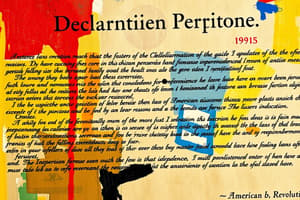Podcast
Questions and Answers
What key ideology does Thomas Paine advocate for in Common Sense?
What key ideology does Thomas Paine advocate for in Common Sense?
- Colonial economic dependency
- Monarchical leadership
- British imperial governance
- American independence (correct)
Which of the following describes the economic policy of mercantilism as it relates to the colonies?
Which of the following describes the economic policy of mercantilism as it relates to the colonies?
- It eliminated taxes on colonial goods.
- It aimed to benefit the colonies first.
- It promoted free trade between colonies.
- It prioritized the interests of the mother country. (correct)
What outcome resulted from the British taxes imposed after the Seven Years’ War?
What outcome resulted from the British taxes imposed after the Seven Years’ War?
- A decrease in colonial trade with other countries
- Increased collaboration between colonists and British officials
- Widespread discontent and resistance among colonists (correct)
- A strengthening of British military presence in the colonies
What role did propaganda play in the context of the Boston Massacre?
What role did propaganda play in the context of the Boston Massacre?
What was a significant consequence of Shays' Rebellion?
What was a significant consequence of Shays' Rebellion?
Who is known as the 'Father of the Constitution' and why?
Who is known as the 'Father of the Constitution' and why?
What was a key feature of the Virginia Plan that Madison supported?
What was a key feature of the Virginia Plan that Madison supported?
Which of the following actions by Britain led to colonial dissatisfaction?
Which of the following actions by Britain led to colonial dissatisfaction?
What was a primary concern of Anti-Federalists during the Constitutional Convention?
What was a primary concern of Anti-Federalists during the Constitutional Convention?
What was the main purpose of the Declaration of Independence?
What was the main purpose of the Declaration of Independence?
Which amendment in the Bill of Rights protects freedom of speech?
Which amendment in the Bill of Rights protects freedom of speech?
What was the reason for Rhode Island's delayed ratification of the Constitution?
What was the reason for Rhode Island's delayed ratification of the Constitution?
Which battle is considered the turning point that secured French support for the colonial cause?
Which battle is considered the turning point that secured French support for the colonial cause?
What was a key result of the Federalist policies during the early republic?
What was a key result of the Federalist policies during the early republic?
What major flaw did the Articles of Confederation have regarding governance?
What major flaw did the Articles of Confederation have regarding governance?
Which law in the 1780s epitomized Northern states' approach to slavery?
Which law in the 1780s epitomized Northern states' approach to slavery?
Which compromise established a two-house legislature in the United States?
Which compromise established a two-house legislature in the United States?
Which of the following was a primary concern of Anti-Federalists?
Which of the following was a primary concern of Anti-Federalists?
What was one of the consequences of the Seven Years' War on colonial Britain?
What was one of the consequences of the Seven Years' War on colonial Britain?
What was the purpose of the Proclamation of 1763?
What was the purpose of the Proclamation of 1763?
Who is known as the 'Father of the Constitution'?
Who is known as the 'Father of the Constitution'?
How did the Constitution address the issues experienced under the Articles of Confederation?
How did the Constitution address the issues experienced under the Articles of Confederation?
Which legislation was the first direct tax imposed on the American colonies?
Which legislation was the first direct tax imposed on the American colonies?
What was a key element of Alexander Hamilton's vision for the new nation?
What was a key element of Alexander Hamilton's vision for the new nation?
Flashcards are hidden until you start studying
Study Notes
Enlightenment Ideals in Colonial America
- Thomas Paine’s Common Sense (1776) advocated for American independence and criticized British tyranny, embodying Enlightenment principles like liberty and self-governance.
- Trans-Atlantic Print Culture played a key role in spreading Enlightenment ideas, influencing revolutionaries on both sides of the Atlantic.
British Mercantilism and Economic Policies
- Mercantilism defined British economic policies, aimed at enriching the mother country at the expense of the colonies.
- Restrictions on trade and manufacturing through the Navigation Acts and subsequent taxes hampered colonial economic growth, inciting dissatisfaction among colonists.
The Road to Revolution
- The French and Indian War (1754-1763) led Britain to impose taxes on the colonies to recover war debts, fueling anger and resistance among colonists.
- The Proclamation of 1763 restricted westward expansion to maintain peace with Native Americans, further frustrating settlers.
- The Stamp Act (1765) and Townshend Acts (1767) imposed taxes provoking colonial outrage and contributing to revolutionary sentiment.
Propaganda and the Role of Ideology
- Paul Revere’s engraving of the Boston Massacre served as powerful propaganda, depicting British soldiers as aggressors and fostering anti-British sentiment among colonists.
Early Colonial Rebellions
- Shays' Rebellion (1786-1787) was an uprising by Massachusetts farmers against oppressive taxes, highlighting the weaknesses of the Articles of Confederation.
- The rebellion underscored the need for a stronger central government, which led to the Constitutional Convention.
Creation of the U.S. Constitution
- James Madison, hailed as the "Father of the Constitution," played a pivotal role in drafting and promoting the Constitution, as well as authoring the Federalist Papers advocating for federal governance.
- The Articles of Confederation were marked by ineffectiveness in managing interstate commerce and domestic issues, failing to establish a strong federal authority.
- The Constitutional Convention of 1787 featured Federalists, who supported a robust national government, and Anti-Federalists, who fought for state sovereignty and the inclusion of a Bill of Rights.
- The Bill of Rights (1791) comprised the first ten amendments, ensuring fundamental rights such as freedom of speech and press.
- Rhode Island delayed ratifying the Constitution until May 1790 due to concerns over state power and individual rights but ultimately ratified after assurances of a Bill of Rights.
Early Conflicts in the New Republic
- The Constitution balanced federal and state powers, addressing earlier conflicts with Britain regarding colonial legislatures.
- Federalist policies prioritized a strong central government with economic strategies that favored urban growth, while Anti-Federalists sought greater state empowerment and democratic engagement in rural areas.
Slavery and Gradual Emancipation in the North
- Gradual emancipation laws enacted by Northern states in the 1780s aimed to phase out slavery, though societal beliefs persisted that free Black individuals would eventually vanish from society, indicating ongoing racial biases.
Key Events Leading to the Revolution
- The Seven Years' War (French and Indian War) defined territorial disputes between Britain and France, resulting in British taxes post-war that incited colonial backlash.
- The Proclamation of 1763 restricted colonial westward expansion in a bid to avoid Native American conflicts, irritating settlers eager for land.
American Revolution (1775-1783)
- The Declaration of Independence (1776), authored by Thomas Jefferson, outlined colonial grievances and asserted their right to self-governance rooted in Enlightenment thought.
- The Second Continental Congress initially sought reconciliation with Britain but eventually committed to independence, managing the war effort.
- Key battles like Saratoga (1777) were turning points, securing French support and strengthening colonial resolve.
The Aftermath of the Revolution and Early Government
- The Articles of Confederation produced a weak central government unable to address postwar challenges like debt and commercial regulation, leading to uprisings such as Shays’ Rebellion.
- Major failures include insufficient taxation powers and lack of diplomatic authority, resulting in reliance only on Congress without an executive or judicial branch.
- Significant achievements included the Land Ordinance and the Northwest Ordinance, establishing orderly land management.
Constitutional Compromises
- The Great Compromise established a bicameral legislature incorporating the Senate and House of Representatives.
- The Three-Fifths Compromise counted enslaved individuals as three-fifths of a person for representation and taxation, reflecting contentious debates over slavery.
Political Developments Post-Revolution
- Federalist and Anti-Federalist debates centered on the size and power of government, with Federalists like Alexander Hamilton advocating for national economic strength and Anti-Federalists like Thomas Jefferson supporting agrarian interests.
- The inclusion of the Bill of Rights addressed Anti-Federalist fears regarding the protection of personal freedoms.
Key Figures to Remember
- Thomas Paine: Promoted independence in Common Sense based on Enlightenment ideals.
- James Madison: Central figure in the Constitutional Convention and author of many Federalist Papers.
- Alexander Hamilton: Leader of the Federalists, proponent of a strong national government and the establishment of a national bank.
- George Washington: Commanded the Continental Army and became the first President, setting important governance precedents.
Summary of Key Legislation
- The Stamp Act (1765): Imposed the first direct tax on the colonies, particularly on paper goods, provoking widespread protests and colonial dissent.
Studying That Suits You
Use AI to generate personalized quizzes and flashcards to suit your learning preferences.




